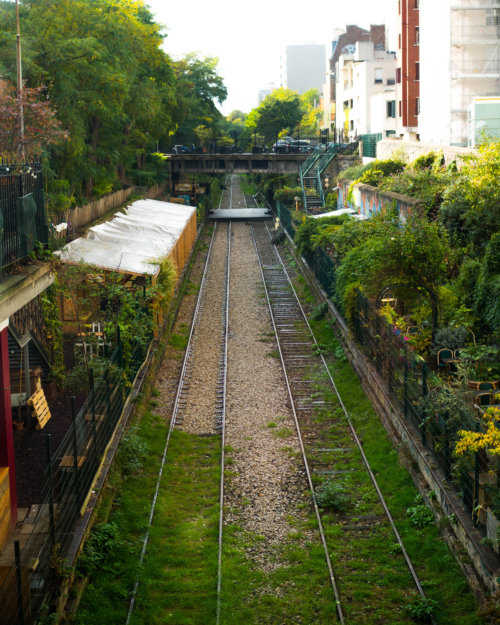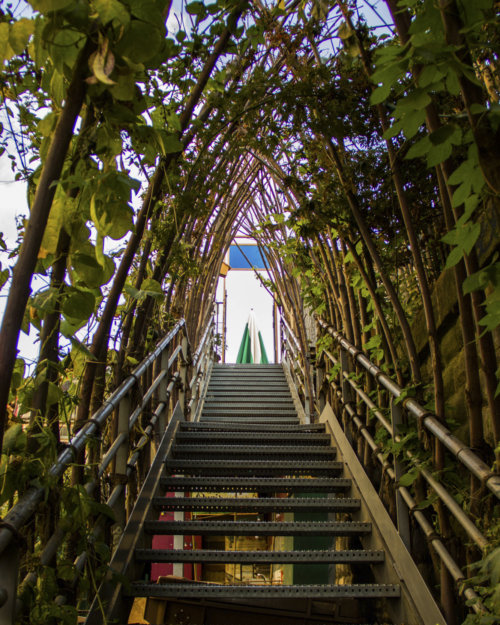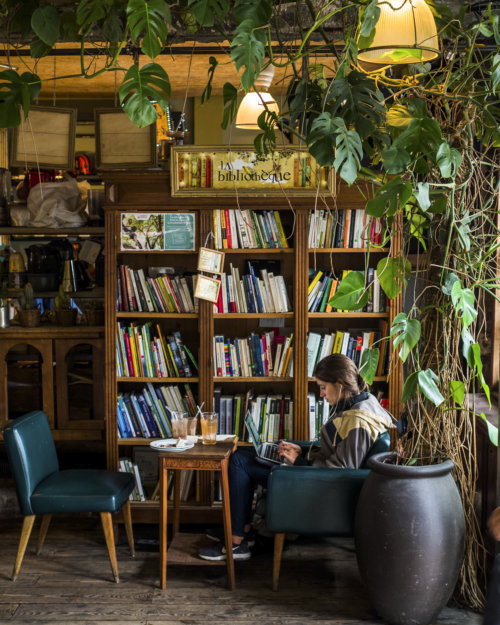
How La REcyclerie Became a Staple of Eco-Chic Paris
One Sunday this Fall, I had an irresistible desire to experiment with something new in the city. After quickly running through recent suggestions I’d gotten from friends, I decided to tackle the unpredictable Line 4 of the Paris metro en route to discover the REcyclerie, a renovated train station at 83 Boulevard Ornano in the 18th Arrondissement of Paris– a place where hipsters, arty young girls with top knots and denim overalls, families, ecological types, and local residents cross paths on a daily basis.
The history of the REcyclerie began in 1950 when the Ornano train station was abandoned, letting nature reconquer this tiny part of the city. Today, the unique bohemia feels a bit like Brooklyn, and is entirely dedicated to eco-responsibility and the passionate philosophy of being an “alternative space”. Its director Stéphane Vatinel’s motto is: “Let’s be serious while having fun”.
When I arrived, the street facade left me a bit perplexed: the provocative squat graffiti and illegal street vendors nearby created a psychological barricade. These days, many of Paris’ trendy new neighborhoods have previously been relegated to the bottom rung of the social ladder– so, overcoming my skepticism, I crossed the threshold.
“Paris’ REcyclerie is made up of numerous interdependent spaces, from the René workshops to the old station waiting room to the terrace and the urban farm. Each space offers new ways to create, repair and recycle.”
To my surprise, I discovered a vast, convivial, welcoming space full of large wood tables that seemed a bit unusual and slightly overwhelming. I was surrounded by all types of materials– wood, metal, glass– that commingled beautifully.
The slightly-triangular facades recall former train stations while the glass roof and back wall emphasized renewal with a breathtaking, almost apocalyptic-vision of the old railway lines overgrown by nature. Plants hang down over the windows and grew up the concrete walls– a 1,000-square-meter microcosm of biodiversity and innovation ideal for anyone who seeks forward-thinking, unusual experiences in Paris (as many visitors and locals do).
The REcyclerie is made up of numerous interdependent spaces, from the René workshops to the old station waiting room to the terrace and the urban farm. Each space offers new ways to create, repair and recycle. Even more than eating a delicious brunch or having a Sunday glass of wine on the mezzanine, it’s the activities and production that make the REcyclerie so special and unique, as it has successfully set up an amazing system of self-sufficiency and self-reliance.
This revolutionary concept, still rare in France, has a strong potential for evolution because of its ecological and informative benefits: each space fulfills the needs of another. For example, the canteen and bar generate a large amount of organic waste essential for running the farm.
The coffee grains, vegetable peels, and cardboard bowls put in the compost are transformed into rich humus for the garden. The chicken coop plays a vital role since the 19 chickens and 1 rooster located on site participate in reducing (i.e. eating) the restaurant’s waste. On Thursdays, neighborhood residents can buy fruits, vegetables and meats at the “La ruche qui dit oui!” market (literally: “The beehive that says yes!”) that specializes in locally-grown, farm-raised produce.
But the mosty striking area runs along the train platforms above the slopes of the former petite ceinture train track. This is the Jardins du ruisseau (the gardens of the stream), which serves as the historic heart of the REcyclerie. The neighborhood’s inhabitants and associations, with their sense of civic duty, were the driving force behind the collective garden association, which was set up by local residents who were the first to become conscious of the place’s charm and potential.
Then the Amis Recycleurs (“Recycling Friends”) association asked its members to “pitch in” and make their own contribution, after which point individuals and associations played began contributing to the operation.
This true Eden, composed of an herb garden, a 400-square-meter collective vegetable garden, and an aquaponics system, encourages the permaculture method– and for good reason! The REcyclerie considers each ecosystem’s biodiversity within the framework of having sustainable agricultural production. It aims for richer, more diverse production without ruining the soil thanks to long-term crop rotations. We thus find complementary plants, like tomatoes and basil, growing alongside each other. Once the herbs, fruits and vegetables are harvested, most go to the on-site restaurant to satisfy its customers’ curious taste buds.
“Like a modern Voltaire, the REcyclerie invites us to cultivate our garden in all senses of the term. It proves that nothing is irreversible, that we can change things by finding alternatives that evolve as society becomes more eco-conscious.”
There’s also an off-ground growing system with a symbiotic fish farm. (This aquaponic system is safely closed-looped because pesticides are not used on the plants, therefore the water is not contaminated.) Another plus of the REcyclerie: rain water supplies the water pumps for even more autonomy. All of these installations are real solutions for the future that resolve problems like how to preserve biodiversity or reduce man’s impact on his environment. Director Stéphane Vatinel believes the query of “How to consume differently?” is “a question we must ask ourselves in the 21st Century in order to go beyond hyper-consumption”.
Like a modern Voltaire, the REcyclerie invites us to cultivate our garden in all senses of the term. It proves that nothing is irreversible, that we can change things by finding alternatives that evolve as society becomes more eco-conscious. By mixing recycling, sustainable development, and culture, the REcyclerie is an eclectic, alternative location– a new staple for the eco-chic crowd in Paris. It is inscribed in a collective awareness that our modern lives, which tend to be ruled by consumerism, often lack meaning. Many of us seeking a new harmony by “going back to the source”, getting closer to nature, and rediscovering a taste for simple, real things will find what they are looking for here. We should heed the REcyclerie’s lessons in economic and social development, especially since its director plans to open a school in the Paris suburbs in 2017 called “The Fertile City”– a new vision of education in which “we will teach how to establish links by using local resources or habits and giving an impulse to a different way of consuming”. In Paris, as for most cities, this is the way of the future.
For more information on the REcyclerie, including hours and current events, visit La REcyclerie’s website.


















































